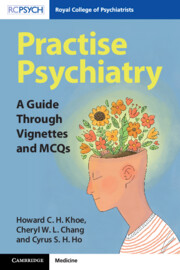Refine search
Actions for selected content:
14 results
Psychiatric education in South Asia
-
- Journal:
- BJPsych Advances , FirstView
- Published online by Cambridge University Press:
- 12 September 2025, pp. 1-3
-
- Article
- Export citation

Practise Psychiatry
- A Guide Through Vignettes and MCQs
-
- Published online:
- 04 September 2025
- Print publication:
- 18 September 2025
Chapter 6 - Digital Clinicians
-
-
- Book:
- Digital Mental Health
- Published online:
- 23 November 2023
- Print publication:
- 07 December 2023, pp 72-80
-
- Chapter
- Export citation
Psychiatric leadership development in postgraduate medical education and training
-
- Journal:
- BJPsych Bulletin / Volume 46 / Issue 3 / June 2022
- Published online by Cambridge University Press:
- 07 May 2021, pp. 174-181
- Print publication:
- June 2022
-
- Article
-
- You have access
- Open access
- HTML
- Export citation
Simulation in Canadian postgraduate emergency medicine training – a national survey
-
- Journal:
- Canadian Journal of Emergency Medicine / Volume 20 / Issue 1 / January 2018
- Published online by Cambridge University Press:
- 17 May 2017, pp. 132-141
- Print publication:
- January 2018
-
- Article
-
- You have access
- HTML
- Export citation
Brilliant Minds: A Snapshot of Successful Indigenous Australian Doctoral Students
-
- Journal:
- The Australian Journal of Indigenous Education / Volume 45 / Issue 1 / August 2016
- Published online by Cambridge University Press:
- 11 May 2016, pp. 70-79
- Print publication:
- August 2016
-
- Article
- Export citation
A national survey of Canadian emergency medicine residents’ comfort with geriatric emergency medicine
-
- Journal:
- Canadian Journal of Emergency Medicine / Volume 19 / Issue 1 / January 2017
- Published online by Cambridge University Press:
- 18 April 2016, pp. 9-17
- Print publication:
- January 2017
-
- Article
-
- You have access
- HTML
- Export citation
Incorporating simulation into a residency curriculum
-
- Journal:
- Canadian Journal of Emergency Medicine / Volume 12 / Issue 4 / July 2010
- Published online by Cambridge University Press:
- 21 May 2015, pp. 349-353
- Print publication:
- July 2010
-
- Article
-
- You have access
- Export citation
Leadership: a central tenet for postgraduate dementia services curricula development in Australia
-
- Journal:
- International Psychogeriatrics / Volume 21 / Issue S1 / April 2009
- Published online by Cambridge University Press:
- 01 April 2009, pp. S16-S24
-
- Article
- Export citation
Human nutrition in medical practice: the training of doctors
-
- Journal:
- Proceedings of the Nutrition Society / Volume 60 / Issue 2 / May 2001
- Published online by Cambridge University Press:
- 28 February 2007, pp. 257-263
-
- Article
-
- You have access
- Export citation
ENT in general practice: training, experience and referral rates
-
- Journal:
- The Journal of Laryngology & Otology / Volume 121 / Issue 6 / June 2007
- Published online by Cambridge University Press:
- 19 October 2006, pp. 580-583
- Print publication:
- June 2007
-
- Article
- Export citation
Development of a Post-graduate Qualification in Disaster Medicine in Australia
-
- Journal:
- Prehospital and Disaster Medicine / Volume 20 / Issue S1 / April 2005
- Published online by Cambridge University Press:
- 28 June 2012, p. 18
- Print publication:
- April 2005
-
- Article
-
- You have access
- Export citation
Resource contribution by Canadian faculties of medicine to the discipline of emergency medicine
-
- Journal:
- Canadian Journal of Emergency Medicine / Volume 3 / Issue 1 / January 2001
- Published online by Cambridge University Press:
- 21 May 2015, pp. 13-18
- Print publication:
- January 2001
-
- Article
-
- You have access
- Export citation
